|
|
|
Sort Order |
|
|
|
Items / Page
|
|
|
|
|
|
|
| Srl | Item |
| 1 |
ID:
074552
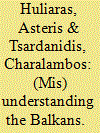

|
|
|
|
|
| Publication |
2006.
|
| Summary/Abstract |
For most Greeks, neighbouring countries like Yugoslavia, Bulgaria, Romania and Albania formed a terra incognita for almost half a century since the end of the Second World War. In the early 1990s communism collapsed in all four countries and despite the three bloody wars that followed the break-up of Yugoslavia, information, goods and people crossed Balkan boundaries in unprecedented speed. The paper examines three geopolitical codes about the Balkans that successively dominated Greek views and policies in the last fifteen years: the idea of a menacing 'muslim arc', the image of the Balkans as a Greek 'natural hinterland' and the idea of the Balkans as an undisputed part of Europe. All these geopolitical ideas were introduced by the Greek political elite and influenced decisively both Greek foreign policy and public attitudes for about half a decade each.
|
|
|
|
|
|
|
|
|
|
|
|
|
|
|
|
| 2 |
ID:
144496
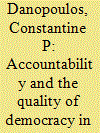

|
|
|
|
|
| Summary/Abstract |
This essay explores and assesses the connection between accountability and the quality of democracy in modern Greece along three key dimensions: vertical, horizontal, and social. Vertical involves elected officials and the three branches of government; horizontal deals with the nonelected arms of government and bureaucratic agencies; and social addresses civil society, the mass media, and nongovernmental organizations. Examination and analysis of the relevant data indicate that the state of accountability in Greece is weak in all three dimensions, and a host of structural, social, and attitudinal factors contributes to this weakness. Accountability problems undermine the quality of democracy. The essay expresses hope that reforms initiated under pressure from the European Union eventually would strengthen accountability and Greece’s quality of democracy.
|
|
|
|
|
|
|
|
|
|
|
|
|
|
|
|
| 3 |
ID:
103994
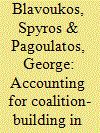

|
|
|
|
|
| Publication |
2011.
|
| Summary/Abstract |
Which parameters affect coalition building in budgetary negotiations? In this article, three distinct levels of analysis are identified to account for coalition building patterns, associated with domestic politics, domestic socioeconomic structures and EU politics. At the level of domestic politics, ideology points to cross-governmental affinity of a partisan nature; at the level of socioeconomic structures, similarity of policy interests, generated by cross-national socioeconomic convergence with EU policy standards, informs coalition formation patterns; at the EU politics level, the intergovernmental power balance influences the political aspirations of each Member State in the integration process and coalition-building decisions. Two sets of parameters affect the evolution of EU coalition patterns, corresponding to the integration impact on the EU (new cleavages) and on the Member States (the impact of Europeanisation). This analytical framework is used to examine the southern coalition (Spain, Greece, Portugal) in the four multi-annual financial frameworks (1988, 1992, 1999 and 2005).
|
|
|
|
|
|
|
|
|
|
|
|
|
|
|
|
| 4 |
ID:
124336
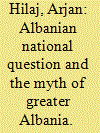

|
|
|
|
|
| Publication |
2013.
|
| Summary/Abstract |
To know what the Albanian National Question (ANQ) is, one should learn it not from what its neighbors, namely Serbia and Greece, have to say, but from a more direct and reliable source, the voice of the Albanians themselves. No nation is in a position in which it can express in a realistic way the needs, rights and aspirations of a different nation in the same way as an individual cannot be an exact representative for anyone but himself. For many years the Western countries used to rely on either Serbian or Greek lenses for the ANQ. In the late 1990s the U.S.-led intervention against Serbia over Kosovo on humanitarian grounds and the Albanian insurgency in Macedonia has contributed to an altered power balance in the region. The neighbors frightened by the power shift in the Southern Balkans use their propaganda machinery to express the danger posed by the alleged Greater Albania scheme in order to demonize and morally downgrade the ANQ. However, one can easily see that Albanians since the creation of their state have not, are not, and will not pursue an irredentist agenda toward their neighbors.
|
|
|
|
|
|
|
|
|
|
|
|
|
|
|
|
| 5 |
ID:
053915
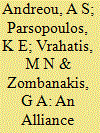

|
|
|
| 6 |
ID:
097793
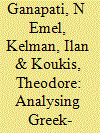

|
|
|
|
|
| Publication |
2010.
|
| Summary/Abstract |
This article contributes to the disaster diplomacy literature in examining the conditions under which disasters can lead to long-term disaster-related collaboration (e.g. in disaster response, recovery or risk reduction) at both governmental and non-governmental level among states in conflict. In particular, the article focuses on the role of the 1999 earthquakes in enhancing such collaboration between Greece and Turkey over the past decade. While acknowledging the diversity and complexity of disaster diplomacy situations, the article suggests that disasters can lead to long-term disaster-related cooperation among states in conflict when: (1) one party providing disaster relief to another party is followed by a similar reciprocal gesture (i.e. tit-for-tat diplomacy); (2) there is a realization and acceptance that neighbours should come to each other's assistance in times of disaster; and (3) there is an enabling broader context (e.g. a rapprochement process) conducive to sustaining the long-term cooperation.
|
|
|
|
|
|
|
|
|
|
|
|
|
|
|
|
| 7 |
ID:
158437


|
|
|
|
|
| Summary/Abstract |
The public image of the European Union (EU) has met increasingly negative evaluations since the economic and financial crisis hit its peak. Although opposition towards the EU has been pitched as a temporary phenomenon, it has now become a distinctive characteristic of European integration, described as ‘embedded’. Recent analyses on citizens’ attitudes towards the EU underline a rational utilitarian dimension, stressing that EU attachment is affected by future life expectations. Are rationalist perspectives the only possible explanation behind the rise of Euroscepticism, though? This article offers an alternative approach, by using discourse analysis, and examines how emotions, as embedded in Eurosceptic discursive frames and practices, may affect attitudes towards the EU. We argue that an analysis of citizens’ opposition through emotions when the salience of the EU increases can show how a Eurosceptic emotion-laden public discourse may become prominent at the domestic level.
|
|
|
|
|
|
|
|
|
|
|
|
|
|
|
|
| 8 |
ID:
101380
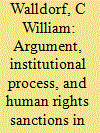

|
|
|
|
|
| Publication |
2010.
|
| Summary/Abstract |
When do humanitarian norms lead great powers, especially democracies, to impose sanctions against strategic partners and allies? I argue that answering more specific questions like this in space and time requires constructivists to focus greater attention on institutional and ideational process. Agents are central to policy change. But the ideational and institutional context in which agents build arguments determines when this change is more or less likely. In this vein, I argue that three factors in liberal states - legislatures, the nature of activist pressure, and strategic ideas - explain when humanitarian norms produce sanctions. I demonstrate the argument through a study of US Cold War relations with South Africa, Turkey, and Greece. Among other contributions, this article demonstrates how attention to process can extend the constructivist agenda into a series of new empirical domains and open avenues for contributions to important policy debates.
|
|
|
|
|
|
|
|
|
|
|
|
|
|
|
|
| 9 |
ID:
083235
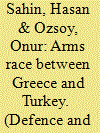

|
|
|
|
|
| Publication |
2008.
|
| Summary/Abstract |
Two NATO allies, Greece and Turkey, have also been considered potential threats to each other. Thus, these countries' military spending has been subject to many academic studies to observe if these potential threats trigger the military spending of both countries. Nonetheless, most regression results of those studies did not find a significant result supporting the arms race between the two countries. The current study provides an additional empirical evaluation of military spending of both countries by using an annual data set running from 1958 to 2004. The study is in spirit of Smith et al. (2000) employing a Markov switching approach, but utilizing a longer period. A Markov switching approach allows estimation of military spending of each country if both sides compete with each other to have higher spending or if they behave independently of each other.
|
|
|
|
|
|
|
|
|
|
|
|
|
|
|
|
| 10 |
ID:
087001
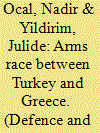

|
|
|
|
|
| Publication |
2009.
|
| Summary/Abstract |
The ongoing Turkish-Greek antagonism has triggered the interest of defense economists to investigate the various aspects of the arms race between Turkey and Greece. However, empirical studies examining the long-run relationship between the military expenditures of the two countries offer little evidence in favor of such an interaction. This paper attributes the poor results of the previous literature to the adherence to linear cointegration techniques and argues that if the adjustment towards long-run equilibrium is asymmetric, nonlinear co-integration models should be employed. Accordingly, this paper considers threshold autoregressive (TAR) and momentum threshold autoregressive (M-TAR) models as alternative adjustment processes for the cointegration relationship, following Enders and Siklos (2001). The results indicate that the relationship between the variables can be characterized by a threshold cointegration specification following an M-TAR type adjustment process.
|
|
|
|
|
|
|
|
|
|
|
|
|
|
|
|
| 11 |
ID:
187352
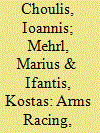

|
|
|
|
|
| Summary/Abstract |
Arms races are linked in the public conscience to potential violence. Following gas discoveries in eastern Mediterranean, Greece and Turkey nearly came to blows in August 2020 and both states have enacted military expansion plans, further risking escalation. We present a novel approach to study the effect of military build-ups on dispute intensity, using monthly data on Turkish incursions into Greek-claimed airspace. Because airspace claims feature strongly in the dispute, these contestations represent an appropriate measure of the intensity with which Turkey pursues the conflict. Theoretically, we suggest that bilateral factors drive this intensity. We argue that increased Greek military capabilities deter incursions whereas increased Turkish military capabilities fuel them. Results from time-series models support the second expectation. Consequently, the study provides a novel methodological approach to studying interstate conflict intensity and shines new light on escalation dynamics in the Greek-Turkish dispute.
|
|
|
|
|
|
|
|
|
|
|
|
|
|
|
|
| 12 |
ID:
128397
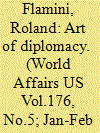

|
|
|
|
|
| Publication |
2014.
|
| Summary/Abstract |
Early in October 2013, a group of high-ranking Greek officials, including Prime Minister Antonis Samaras, came to Washington for the opening of a major art exhibition from their country at the National Gallery of Art. But the black-tie event and the press conference to inaugurate the show, "Heaven and Earth: Art of Byzantium from Greek Collections," were both canceled because of the government shutdown. As a result, a party of angry Greeks left for home muttering darkly about fearing Americans when you bear them gifts. The Greeks were not even allowed a private visit to the exhibition in which virtually every precious icon, ancient manuscript, and piece of mosaic had been loaned by museums and institutions in their country.
|
|
|
|
|
|
|
|
|
|
|
|
|
|
|
|
| 13 |
ID:
126676
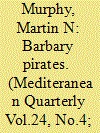

|
|
|
|
|
| Publication |
2013.
|
| Summary/Abstract |
This essay describes the piracy that took place in the Mediterranean from the time of ancient Greece to Barbary. It explains the corso, the sea war between nonstate but state-endorsed Christian and Muslim parties, with reference to the Knights of Malta and, more extensively, the Barbary corsairs. Although the essay focuses primarily on history, it also draws some conclusions about piracy and the international system today. The essay notes a prevailing assumption that contemporary piracy off Somalia and that perpetrated by the Barbary pirates is similar, but it further notes that any similarities are slight and superficial. At the same time, similarities rooted in economic, social, and political change do exist between all outbreaks of depredation at sea and the responses to them.
|
|
|
|
|
|
|
|
|
|
|
|
|
|
|
|
| 14 |
ID:
180025
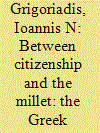

|
|
|
|
|
| Summary/Abstract |
As one of Turkey’s non-Muslim minorities, Turkey’s Greeks have faced substantial pressures since the founding of republican Turkey. As its members could not claim their constitutional rights as citizens of Turkey, emigration soared and the minority reached a point of near extinction. Significant improvements were noted when the EU-supported reform transformed the Turkish state and society from 1999 to 2010, which were not reversed as Turkey relapsed to democratic backsliding in the following years. This article explores the social dynamics and ideological frameworks that have contributed to novel perceptions of the Greek minority since after 2002, the year the Justice and Development Party (Adalet ve Kalkınma Partisi-AKP) came to power and have deterred a significant deterioration since Turkey’s democratic backsliding began. It also examines the state of Turkey’s Greeks by focusing on the state of the pious foundations, the Papa Eftim affair and the situation in the islands of Gökçeada (Imbros) and Bozcaada (Tenedos).
|
|
|
|
|
|
|
|
|
|
|
|
|
|
|
|
| 15 |
ID:
187484
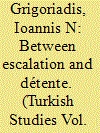

|
|
|
|
|
| Summary/Abstract |
This paper aims to evaluate the state of Greek-Turkish relations in light of recent developments in the reconfiguration of Turkish foreign policy. Following twenty years of détente and relative calm in bilateral relations, the year 2020 witnessed two escalations in Greek-Turkish relations, one in March involving refugees and immigrants on the Greek-Turkish land border and another in August involving military vessels of the two countries. The refugee crisis and potential military conflict regarding energy exploration in the Eastern Mediterranean have raised tensions at a moment the political and institutional tools for the promotion of conflict resolution between Greece and Turkey linked to Turkey’s EU membership perspective appear to be obsolete. This paper seeks an answer to the question of whether structural or ideational factors played the most prominent role in the recent escalation of the Greek-Turkish disputes.
|
|
|
|
|
|
|
|
|
|
|
|
|
|
|
|
| 16 |
ID:
122372
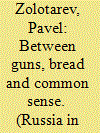

|
|
|
|
|
| Publication |
2013.
|
| Summary/Abstract |
The current trend is such that military force is gradually turning from a foreign policy tool into a military power potential. The purpose is to solve political tasks without using military force but relying entirely on the superiority in military potential.
|
|
|
|
|
|
|
|
|
|
|
|
|
|
|
|
| 17 |
ID:
165183
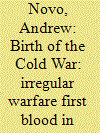

|
|
|
|
|
| Summary/Abstract |
While often held up as a model of successful American counterinsurgency, the Greek Civil War presents a unique case. Peculiar local conditions and geopolitics contributed to the defeat of communist forces in Greece. A firm British and later American commitment to combating communism stood in contrast to ambiguous support from the Soviet Union in an area they considered outside of their sphere of influence. Strong nationalist feeling among the Greek population buttressed support for the government and undermined the ‘internationalist’ concessions of communist forces. These characteristics make the extrapolation of broader lessons focused on victory through the application of overwhelming American resources and the financing of local forces problematic. If lessons are to be gleaned from this case, they should focus on the critical roles played by internal political dynamics and geopolitics in undermining the strength of the insurgent forces and how these provided a stable platform from which the counterinsurgents could operate.
|
|
|
|
|
|
|
|
|
|
|
|
|
|
|
|
| 18 |
ID:
129117
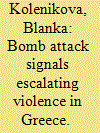

|
|
|
| 19 |
ID:
116786
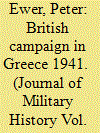

|
|
|
|
|
| Publication |
2012.
|
| Summary/Abstract |
This article looks afresh at the decision by Britain to despatch an expeditionary force to Greece in 1941 to oppose the much-anticipated decision by Hitler, to end by German invasion the inept Italian campaign against Athens. The existing work on this topic emphasises the geo-political motives behind the campaign, especially Churchill's need to impress American public opinion by going to the aid of the Greeks, often with an assumption that British military leaders committed themselves to the venture against their better judgement. What these accounts overlook is what British planners thought was operationally possible. This article is based on new archival research, which indicates that key British leaders, throughout the chain of command, thought Greek topography would prevent the Wehrmacht from repeating the success of armoured warfare achieved by the Germans in France. In considering this material, the article sheds new light on the failure of British military leaders to fully understand the possibilities of armoured warfare, and thus adds to our understanding of the doctrinal reasons for poor British battlefield performance in the 1940-42 period more generally.
|
|
|
|
|
|
|
|
|
|
|
|
|
|
|
|
| 20 |
ID:
129944
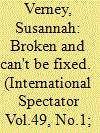

|
|
|
|
|
| Publication |
2014.
|
| Summary/Abstract |
The Greek election of May 2012 failed to produce a government, resulting in repeat elections six weeks later. This shock outcome was a symptom of a broader delegitimation of the national political system. Over the past decade Eurobarometer data show a much more extensive loss of confidence in political institutions in Greece than in the European Union as a whole. In a first phase, rising political discontent was managed within the traditional political framework through alternation in power between the two major parties. In contrast, the second phase, following the outbreak of the Greek sovereign debt crisis, led to the dramatic fragmentation of the party system and changed the mode of government formation. This process is not reversible and entails serious democratic dangers.
|
|
|
|
|
|
|
|
|
|
|
|
|
|
|
|
|
|
|
|
|